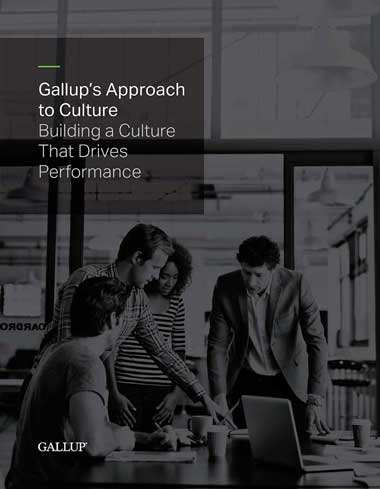Story Highlights
- Less than half of U.S. employees know what their organization stands for
- Leaders should convey culture and engagement organically, not just in formal settings
- Conversations are the key to performance development
The world's greatest workplace cultures do not happen by accident.
Leaders, managers and employees at every level of the organization intentionally cultivate and support the organizational culture.
Once a plan for culture change is in place, the unified voice from the top should be clear: This is how we do business. This is an expected part of how we work. This is our culture.
Gallup research reveals that less than half of U.S. employees (41%) strongly agree that they know what their organization stands for and what makes it different from its competitors.
This statistic presents leaders with a critical wake-up call -- and an opportunity to get to work. And that work begins with communicating.
Conversations are the key to performance development. Getting conversations right is the most important thing you can do.
Executives and HR leaders must set the example by using engagement language as part of daily, organic communication -- and this kind of communication should be encouraged at all levels. Leaders need to verify that their messages have reached front-line employees .
Remember that managers and individual contributors can get a reason for change just by asking -- but if a culture change is what's desired, employees have to hear and feel the need for change. They need to know how a focus on individual development flows from the organization's mission or purpose. And they need to know why it will lead to better performance and results.
Take these five actions to clearly convey your culture change:
- Create communication plans that support engagement initiatives and priorities.
- Consistently and routinely communicate the rationale for and benefits of an engagement-focused culture.
- Encourage employees to discover and share best practices to create a vivid picture of what highly engaged teams look like and how they perform.
- Designate an engagement champions network that communicates, collects best practices to share with other managers, answers questions and supports manager development.
- Embed specific engagement elements into ongoing conversations, connecting engagement to business needs and challenges. For example, make materials and equipment a topic of discussion. Ask the team: Do you have what you need to do high-quality work? What's missing?
When it comes to workplace communication, the reality is that only 7% of employees report receiving daily feedback from their manager. Further, when Gallup asks employees how satisfied they are with their boss or immediate supervisor, 59% say they are "completely satisfied" -- unchanged from 2010, when 58% said the same. The fact that this percentage hasn't improved in a decade is a testament to a chronic lack of conversations that engage or inspire performance. And that's a huge missed opportunity. The best managers connect with their employees every day. And while some managers might argue that they don't "have the time" for frequent chats, the point is this: Conversations are the key to performance development. Getting conversations right is the most important thing you can do.
Making any kind of culture change requires clear vision, direction and communication. And with change comes all the emotions that surround that word. Because change will always have its skeptics, corporate communications should share best-practice examples of how engagement has positively influenced business outcomes.
Leaders also need to communicate new expectations over the long term, especially if employees have seen multiple initiatives come and go.
Few things are as hard to change as company culture. But leaders can start by increasing the frequency and clarity of their communication to help employees see the benefits of an intentional focus on engagement.
What is your culture doing for your company?
- Build a high-development workplace culture driven by engagement. Download our paper to learn how.
- Create a culture that inspires people. A strategic partnership with Gallup will help you develop a culture that differentiates you from the competition.
- How would Gallup do it? Read our paper to learn Gallup's approach to building a culture that enhances your brand, improves business results and fulfills your organization's purpose.





